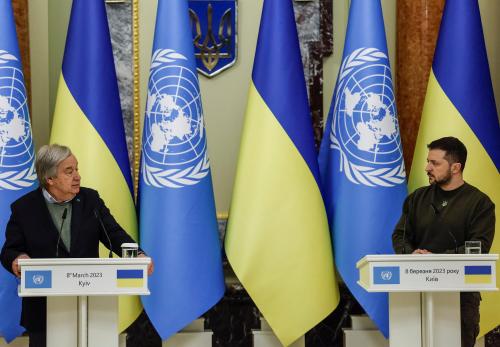The case before the U.S. Supreme Court on the right of Massachusetts and several California localities to promulgate regulations on foreign trade—specifically, to impose sanctions on Myanmar, formerly Burma, for human-rights violations—is a clear test of the post-Cold War maxim to “think globally, act locally.”
The court’s decision will settle an important constitutional question and influence the course of citizen participation in foreign affairs for years to come. But the case hinders the ability of the United States to persuade Myanmar’s military junta to relax its repression of political and civil rights—not because it holds out the possibility of further sanctions, but because it perpetuates a false analogy.
The issue of local sanctions originated in grassroots efforts in the 1980s to punish apartheid in South Africa by restricting state and local trade with that government. Only a generation past their own civil-rights movement, Americans found much in the South African situation that resonated. When apartheid collapsed, they could point to a connection between their own actions and a foreign-policy success.
Such satisfying outcomes are rare, but a distilled version of the South Africa model—with heavy emphasis on sanctions—has stuck. In the 1990s, activists transposed this phenomenon onto Myanmar policy. In drafting sanctions legislation in Massachusetts, they literally crossed out “South Africa” on an anti-apartheid bill and wrote in “Burma.”
This legal symmetry notwithstanding, parallels between apartheid in South Africa and military rule in Burma are largely cosmetic. They center on the international appeal of two opposition leaders and former political prisoners, Nelson Mandela and Aung San Suu Kyi. Both are Nobel laureates, winners of the peace prize.
The military’s nullification of the 1990 Myanmar elections, which would have put Suu Kyi’s National League for Democracy into power, seemed all the worse when Mandela won South Africa’s first post-apartheid election in 1994.
But the similarities stop there. The challenge in South Africa was to extend the political and civil rights enjoyed by white South Africans to the black majority. There are no privileged pockets of democracy and human rights in Myanmar; authoritarianism sweeps across the system and society.
For most of the apartheid era, political divisions followed strict ethnic lines. However, unofficial, low-key efforts at ethnic reconciliation paved the way for political reform.
The situation in Myanmar is too polarized at this time for such informal dialogues to take hold. In addition, the nature of the power struggle there, centered in civil-military relations, makes it difficult to jumpstart a democratic transition.
Bringing a dominant military under democratic civilian control is a complicated process. Both the civilian and military sectors must be transformed while the military retains the power to ensure national security.
Equally important, the international roles of the two countries are markedly different. The apartheid regime and the white population in South Africa considered itself to be part of the Western community. Isolation from the international economy and exclusion from international sports were psychological blows.
Myanmar, on the other hand, has only recently emerged from decades of self-isolation. Western attempts to isolate it only confirm the regime’s nationalist (and xenophobic) fears of foreign domination.
Moreover, solidarity among the advanced democracies to sanction Myanmar is beginning to fray. Japan is considering resuming its economic assistance program for Burma, and Australia has offered human-rights training to Myanmar’s military.
Nor are the regional dynamics similar. South Africa was surrounded by black African states hostile to apartheid, some of which were the targets of military incursions by Pretoria. These sub-Saharan states were the cutting edge of the international anti-apartheid movement, gradually drawing in the Western nations.
In contrast, Myanmar was recently admitted to the Association of Southeast Asian Nations, strengthening its legitimacy in the region.
The Supreme Court case on local sanctions will add an important footnote to the definition of federalism in the United States. But it also turns U.S. policy for Myanmar away from its essential task, crafting effective measures to help break a political stalemate which has endured for a decade.
At present, our Myanmar policy is about what worked (or what we think worked) in another country, and, because of the constitutional controversy, it is about us.
But we needn’t wait for a decision from the bench to reexamine the Myanmar equation and, if necessary, recalibrate our policy.


Commentary
Op-edMyanmar Case Perpetuates False Analogies
April 17, 2000